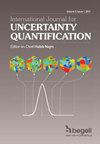利用信息论对正则化任意多元素多项式混沌进行贝叶斯³主动学习
IF 1.8
4区 工程技术
Q2 ENGINEERING, MULTIDISCIPLINARY
International Journal for Uncertainty Quantification
Pub Date : 2024-09-01
DOI:10.1615/int.j.uncertaintyquantification.2024052675
引用次数: 0
摘要
机器学习、代用建模和不确定性量化在数据匮乏的应用中面临着挑战,这是因为测量数据的可用性有限或模型的计算成本昂贵。当只有有限数量的训练点可用时,通常会使用从高斯过程模拟器(GPE)或多项式混沌展开(PCE)衍生出的专业模型。PCE(或其数据驱动版本,即任意多项式混沌)基于全局表示法,由模型参数的分布提供信息,而 GPE 则依赖于局部内核,并额外评估代用指标本身的不确定性。消除振荡的 PCE 局部化会增加自由度 (DoF),从而需要更多的训练样本。由于贝叶斯推理(BI)等应用需要高精度的代用指标,即使是像 PCE 或 GPE 这样的专业模型也需要大量的训练数据。基于信息论(IT)的 GPE 贝叶斯主动学习(B³AL)可以减少贝叶斯推理所需的训练样本数量。基于 IT 的 B³AL 理念还不能直接应用于 PCE 系列,因为该系列在设计上缺乏对代理不确定性的认识。在本研究中,我们引入了贝叶斯正则化版本的局部任意多项式混沌来建立代用模型。我们的全自适应性框架具有高斯仿真器特性,并采用 B³AL 方法进行了增强,旨在为 BI 建立可靠的代用模型,同时通过 IT 高效地选择训练样本。通过对几个数值示例的综合评估,证明了所提方法的有效性。本文章由计算机程序翻译,如有差异,请以英文原文为准。
Bayesian³ Active learning for regularized arbitrary multi-element polynomial chaos using information theory
Machine learning, surrogate modeling, and uncertainty quantification pose challenges in data-poor applications that arise due to limited availability of measurement data or with computationally expensive models. Specialized models, derived from Gaussian process emulators (GPE) or polynomial chaos expansions (PCE), are often used when only limited amounts of training points are available. The PCE (or its data-driven version, the arbitrary polynomial chaos) is based on a global representation informed by the distributions of model parameters, whereas GPEs rely on a local kernel and additionally assess the uncertainty of the surrogate itself. Oscillation-mitigating localizations of the PCE result in increased degrees of freedom (DoF), requiring more training samples. As applications such as Bayesian inference (BI) require highly accurate surrogates, even specialized models like PCE or GPE require a substantial amount of training data. Bayesian³ active learning (B³AL) on GPEs, based on information theory (IT), can reduce the necessary number of training samples for BI. IT-based ideas for B³AL are not yet directly transferable to the PCE family, as this family lacks awareness of surrogate uncertainty by design. In the present work, we introduce a Bayesian regularized version of localized arbitrary polynomial chaos to build surrogate models. Equipped with Gaussian emulator properties, our fully adaptive framework is enhanced with B³AL methods designed to achieve reliable surrogate models for BI while efficiently selecting training samples via IT. The effectiveness of the proposed methodology is demonstrated by comprehensive evaluations on several numerical examples.
求助全文
通过发布文献求助,成功后即可免费获取论文全文。
去求助
来源期刊

International Journal for Uncertainty Quantification
ENGINEERING, MULTIDISCIPLINARY-MATHEMATICS, INTERDISCIPLINARY APPLICATIONS
CiteScore
3.60
自引率
5.90%
发文量
28
期刊介绍:
The International Journal for Uncertainty Quantification disseminates information of permanent interest in the areas of analysis, modeling, design and control of complex systems in the presence of uncertainty. The journal seeks to emphasize methods that cross stochastic analysis, statistical modeling and scientific computing. Systems of interest are governed by differential equations possibly with multiscale features. Topics of particular interest include representation of uncertainty, propagation of uncertainty across scales, resolving the curse of dimensionality, long-time integration for stochastic PDEs, data-driven approaches for constructing stochastic models, validation, verification and uncertainty quantification for predictive computational science, and visualization of uncertainty in high-dimensional spaces. Bayesian computation and machine learning techniques are also of interest for example in the context of stochastic multiscale systems, for model selection/classification, and decision making. Reports addressing the dynamic coupling of modern experiments and modeling approaches towards predictive science are particularly encouraged. Applications of uncertainty quantification in all areas of physical and biological sciences are appropriate.
 求助内容:
求助内容: 应助结果提醒方式:
应助结果提醒方式:


